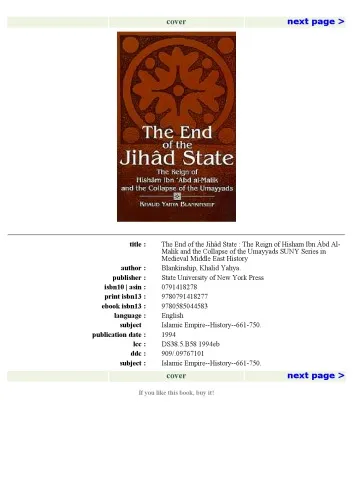The End of the Jihad State: The Reign of Hisham Ibn ’Abd al-Malik and the Collapse of the Umayyads
4.0
Reviews from our users

You Can Ask your questions from this book's AI after Login
Each download or ask from book AI costs 2 points. To earn more free points, please visit the Points Guide Page and complete some valuable actions.Related Refrences:
Introduction to "The End of the Jihad State"
"The End of the Jihad State: The Reign of Hisham Ibn ’Abd al-Malik and the Collapse of the Umayyads" provides a meticulous and thought-provoking analysis of one of the most transformative periods in Islamic history. Written by Khalid Y. Blankinship, this book delves deeply into the institutional, political, and ideological dynamics that shaped the Umayyad Caliphate, focusing particularly on the reign of Hisham Ibn 'Abd al-Malik. The work unpacks the decline of a global religious empire united under an expansive goal of jihad and explores how these factors contributed to the eventual collapse of the Umayyad dynasty.
The book underscores the inherent tensions within an empire driven by religious conquest while grappling with socioeconomic complexities and administrative inefficiencies. Through rigorous use of primary sources, including Arabic chronicles and other contemporaneous texts, Blankinship provides a balanced narrative that moves beyond conventional historiography. It situates the story of the Umayyads within a broader framework of world history, emphasizing the interplay between ideology, governance, and empire-building. This introduction outlines the book's detailed summary, key takeaways, notable quotes, and its significance.
A Detailed Summary of the Book
The book chiefly focuses on the reign of Hisham Ibn 'Abd al-Malik (r. 724–743), one of the longest-serving Umayyad caliphs. Hisham's leadership occurred during a critical juncture for the Islamic Caliphate, which was rapidly expanding territorially through campaigns of jihad but simultaneously struggling internally due to administrative challenges and growing sociopolitical discontent. Blankinship explores how the ideology of jihad served as both the driving force behind the empire's initial success and a source of its eventual undoing.
"The End of the Jihad State" argues that the Umayyad state's commitment to a militaristic ideology, centered on perpetual expansion and conquest, became unsustainable. Hisham's reign was marked by efforts to consolidate power, manage tribal rivalries, and maintain fiscal stability, but these efforts ultimately fell short in the face of mounting opposition. After Hisham's death, the Umayyads faltered under military pressures, economic strains, and uprisings, culminating in the Abbasid Revolution in 750 CE.
The book meticulously examines key events, including the wars on multiple fronts—such as the campaigns against the Byzantine Empire and the conflicts in Central Asia—and the Caliphate's inability to fully incorporate new territories economically and socially. Blankinship also sheds light on the ideological rift between the ruling elite and other Muslim groups, particularly the emerging Abbasid faction, which successfully leveraged dissatisfaction to overthrow Umayyad rule.
Key Takeaways
- The ideological foundations of the Umayyad Caliphate, particularly its commitment to jihad as a state project, ultimately undermined its longevity.
- Sociopolitical and tribal divisions within the empire weakened its cohesion and made the central authority vulnerable to external and internal challenges.
- Hisham Ibn 'Abd al-Malik's reign represents both the peak of Umayyad administrative competence and the beginning of its irreversible decline.
- The Abbasid Revolution was catalyzed in part by the Umayyad system's failure to address the economic and social grievances of its diverse population.
- The book serves as a reminder of the difficulties inherent in empire management, especially when ideological rigidity conflicts with pragmatic governance.
Famous Quotes from the Book
"The commitment to jihad, while initially uniting the Umayyad state under a single purpose, became a burden too great for the empire to bear."
"The rise and fall of the Umayyad Caliphate show the precarious balance between ideological zeal and the practical necessities of governance."
"The Abbasids exploited discontent but also represented a vision of leadership that resonated with the changing dynamics of the Muslim world."
Why This Book Matters
"The End of the Jihad State" is a significant contribution to the study of Islamic history and world empires. It bridges the gap between ideological analysis and practical governance, offering insights that are applicable to understanding both historical and contemporary state systems. By examining the Umayyad Caliphate, Blankinship sheds light on the nature of political legitimacy, state formation, and the costs of overextension.
The book's relevance extends beyond Islamic studies, as it engages with universal themes of imperial administration, ideological commitments, and the challenges of leadership in diverse and expansive territories. Scholars, historians, and policymakers alike can draw valuable lessons from the rise and fall of the Umayyads, making this book essential for anyone interested in the dynamics of empire.
Free Direct Download
You Can Download this book after Login
Accessing books through legal platforms and public libraries not only supports the rights of authors and publishers but also contributes to the sustainability of reading culture. Before downloading, please take a moment to consider these options.
Find this book on other platforms:
WorldCat helps you find books in libraries worldwide.
See ratings, reviews, and discussions on Goodreads.
Find and buy rare or used books on AbeBooks.
1622
بازدید4.0
امتیاز0
نظر98%
رضایتReviews:
4.0
Based on 0 users review
Questions & Answers
Ask questions about this book or help others by answering
No questions yet. Be the first to ask!














